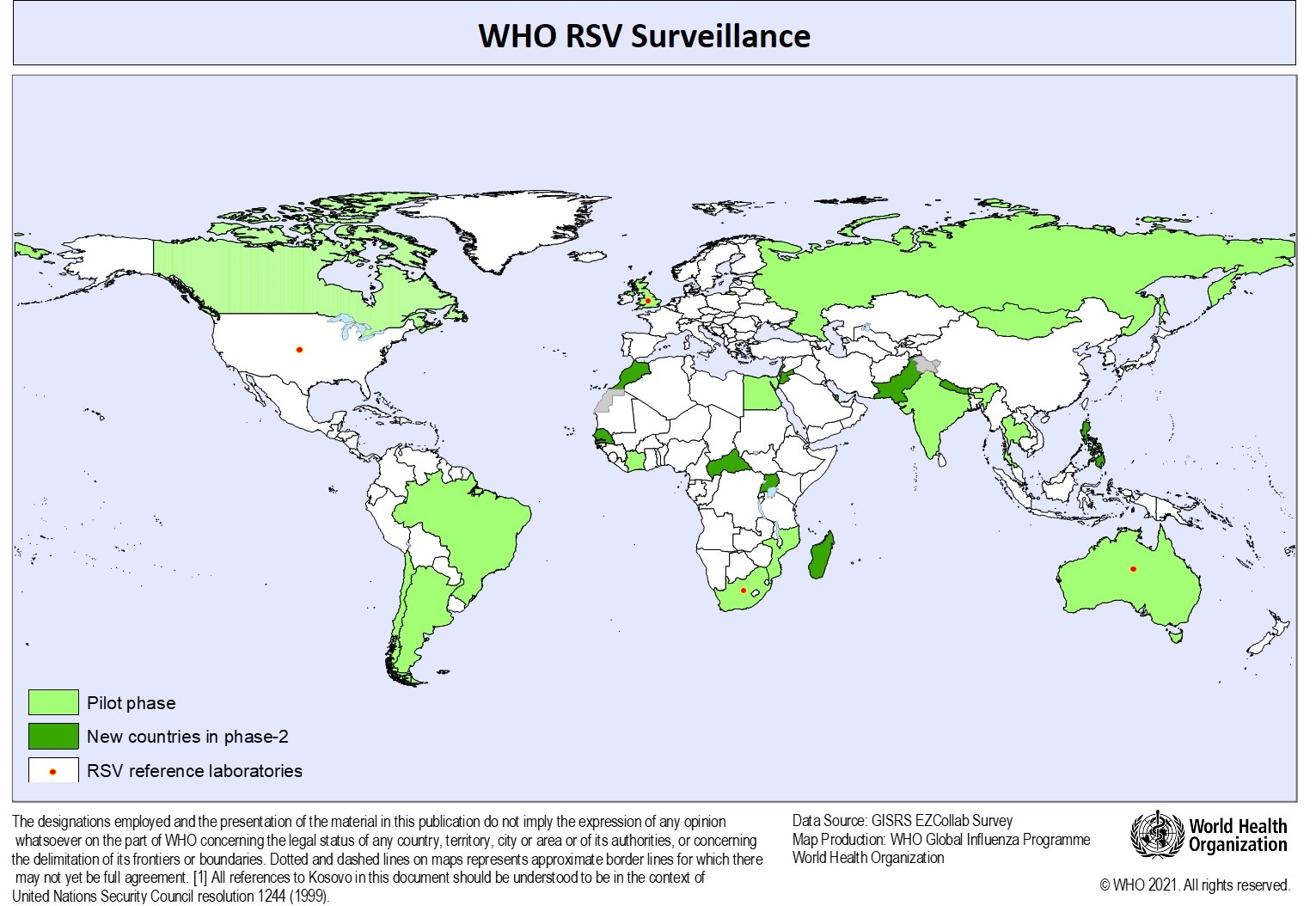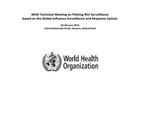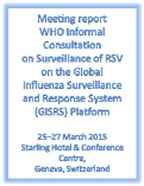Respiratory Syncytial Virus Surveillance
Respiratory Syncytial Virus (RSV) is a leading cause of hospitalization due to acute lower respiratory infection especially in infants and young children. Currently available options (Palivizumab) for preventing and treating RSV are limited to select populations in high-resource settings. Fortunately, several vaccine candidates are now in the human testing phase targeting young children, older adults and pregnant women, and an effective safe vaccine is likely to be available in the near future.
The WHO Global Influenza Programme with support from the Bill & Melinda Gates Foundation, piloted a RSV surveillance strategy Phase I based on the Global Influenza Surveillance and Response System (GISRS) in 14 countries in order to standardized RSV surveillance and provide evidence to support Public Health and to inform RSV vaccination policy. The output from the pilot project establishes a solid RSV surveillance strategy with evidence-based standards and a tested mechanism for RSV surveillance based on the GISRS. The phase II has started with a 3-year extension phase (Nov 2018 – Oct 2021) aims to consolidate the achievements of the original investment.
WHO launches phase II
WHO launches phase II of the Global Respiratory Syncytial Virus Surveillance
The 3-year extension phase (Nov 2018 – Oct 2021) aims to consolidate the achievements of the original investment and proposes to
(a) enhance the surveillance in infants and young children less than 2y,
(b) focus on the more severe disease requiring hospitalization,
(c) widen virologic monitoring to differentiate virus types and to identify genetic groups, and
(d) generate a robust understanding of the seasonality, risk groups and disease burden particularly RSV-associated hospitalization burden in LMICs with a wider geographic representation in all WHO Regions.
Read more on WHO RSV surveillance strategy of Phase II
The RSV disease burden can be characterized in several different ways (Pebody et al, 2019 https://doi.org/10.1111/irv.12667 ). In the absence of resources for special disease burden studies, a tiered approach towards disease burden estimation using surveillance data is proposed for the second phase of RSV surveillance. Even simple estimates of proportion of RSV-associated hospitalizations are important to raise awareness of disease burden among policy-makers and providers.
The WHO RSV surveillance program aims to provide countries with a platform based on established approaches to collect these data.

Meeting reports
Respiratory syncytial virus sequencing considerations for an expanded Global Influenza Surveillance and...
In recent years, rapid progress has been made in the development of new pharmaceutical interventions against respiratory syncytial virus (RSV), including...
Progress of respiratory syncytial virus surveillance and disease burden estimation based on the Global...
The WHO has implemented the RSV surveillance strategy based on GISRS since 2015. Based on the experiences gained in integrated surveillance of influenza...
Summary report on the WHO workshop on estimation of respiratory syncytial virus (RSV) disease burden...
This report summarizes the proceedings from the “WHO workshop on estimation of respiratory syncytial virus (RSV) disease burden based on RSV surveillance...

WHO Meeting of Final Review of the RSV Surveillance Pilot Based on the Global Influenza Surveillance...
The meeting summarized the outcomes and the lessons learnt from the pilot phase. Key takeaway messages included the feasibility of leveraging the influenza...
WHO meeting of mid-term review of the RSV surveillance pilot based on the global influenza surveillance...
A standardized and robust global Respiratory Syncytial Virus (RSV) surveillance system is important to better understand the seasonality of RSV infections...

Respiratory syncytial virus (RSV) is an important viral respiratory pathogen, causing acute, sometimes fatal lower respiratory tract infections in infants...

WHO Informal Consultation on Surveillance of RSV on the Global Influenza Surveillance and Response System...
Respiratory syncytial virus (RSV) is the leading viral cause of acute lower respiratory tract infections in infants and young children in whom this virus...
References
- Cai W, Buda S, Schuler E, Hirve S, Zhang W, Haas W, Buda S. Risk factors for hospitalized respiratory syncytial virus disease and its severe outcomes. Influenza Other Respi Viruses. 2020
- Jackson S, Peret T, Ziegler T, Hirve S, ……, Zhang W. Results from the WHO external quality assessment for the respiratory syncytial virus pilot, 2016-17. Influenza Other Respi Viruses. 2020
- Chadha M, Hirve S, Bancej C, Barr I, Baumeister E, Caetano B, Chittaganpitch M, Darmaa B, Ellis J, Fasce R, Herve K, Jackson S, Leung V, Pisareva M, Moyes J, Naguib A, Tivane A, Zhang W. Human respiratory syncytial virus and influenza seasonality patterns – Early findings from the WHO global respiratory virus surveillance. Influenza Other Respi Viruses. 2019
- Pebody R, Moyes J, Hirve S, Campbell H, Jackson S, Moen A, Nair H, Simões E, Smith PG, Wairagkar N, Zhang W. Approaches to use the WHO Respiratory Syncytial Virus Surveillance platform to estimate disease burden. Influenza Other Respi Viruses. 2019
- Hirve S, Crawford N, Palekar R, Zhang W, WHO RSV Surveillance Group. Clinical characteristics, predictors and performance of case definition – interim results from the WHO global respiratory syncytial virus surveillance pilot. Influenza Other Respi Viruses. 2019
- Pebody R, Moyes J, Hirve S, Campbell H, Jackson S, Moen A, Nair H, Simões E, Smith PG, Wairagkar N, Zhang W. Approaches to use the WHO Respiratory Syncytial Virus Surveillance platform to estimate disease burden. Influenza Other Respi Viruses. 2019
- Broor S, Campbell H, Hirve S, Hague S, Jackson S, Moen A, Nair H, Palekar R, Rajatonirina S, Smith P, Venter M, Wairagkar N, Zambon M, Ziegler T, Zhang W. Leveraging the Global Influenza Surveillance and Response System for global respiratory syncytial virus surveillance – opportunities and challenges. Influenza Other Respi Viruses. 2019
- Cai W, Tolksdorf K, Hirve S, Schuler E, Zhang W, Haas W, Buda S. Evaluation of using ICD-10 code data for respiratory syncytial virus surveillance. Influenza Other Respi Viruses. 2019
